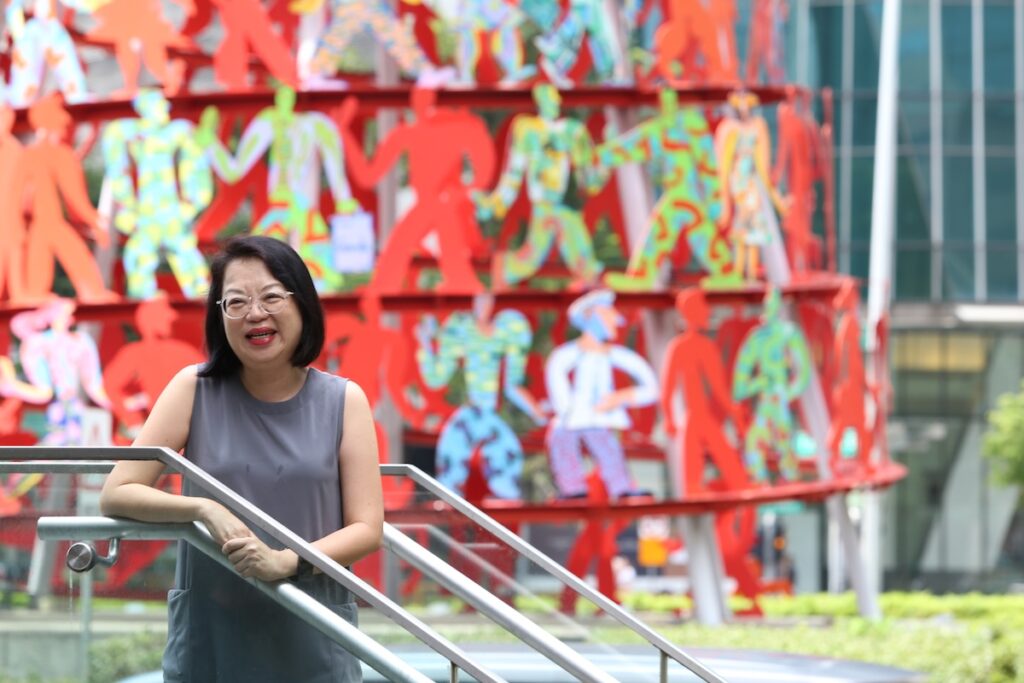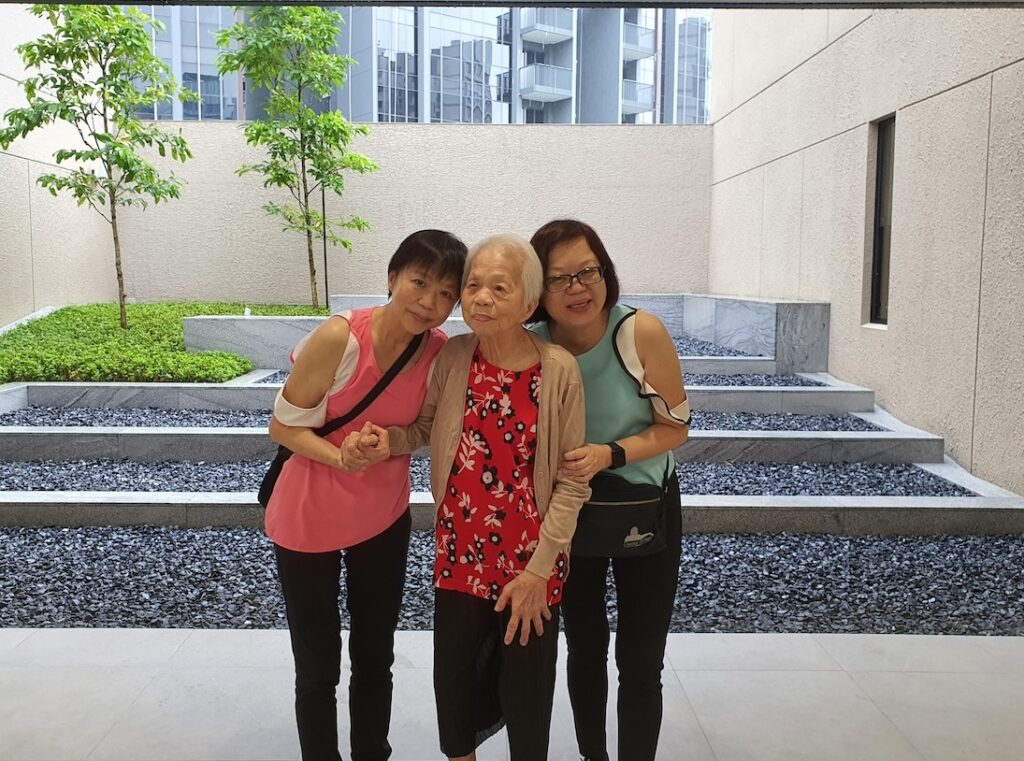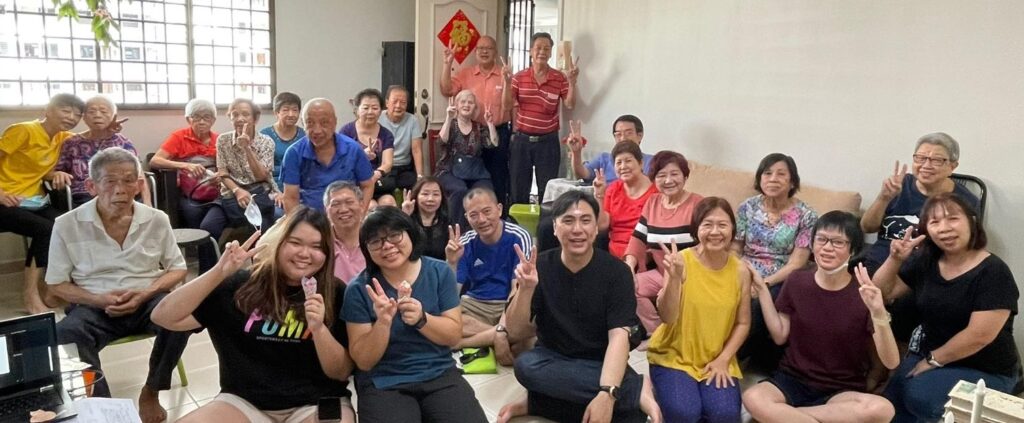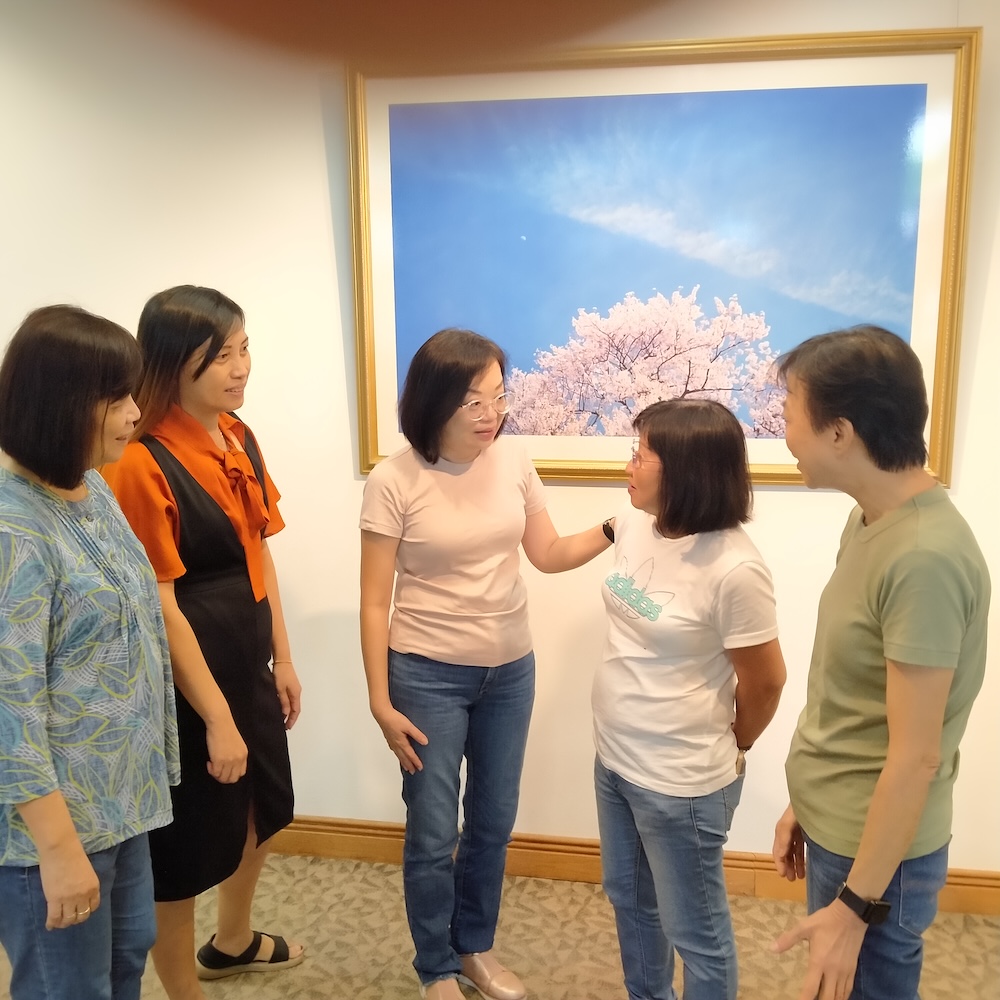
Ong Lilian
Women Division
Ong Lilian shares how through undeterred prayers and actions, her mother Ong Gek Keow brought her sister Ong Lay Hwa Doreen and her back to the path of faith. Even in the face of a series of health karma, her mother managed to lessen her karmic retribution, overcome them one after another, and lead a victorious life.
The phone rang at midnight, delivering the long-awaited news about our mother. According to the police, a woman who matched our mother’s description was seen knocking on the door of an HDB flat, searching for her daughter. We hurried to the location, and to our immense relief, it was indeed our mother. We were grateful to have found her within 12 hours.
In 2016, we suspected that our mother was experiencing early-onset dementia, although she had no obvious symptoms yet. One day in 2017, my sister went to queue for a step tracker near our house with my mother. She asked my mother to sit on a stone chair nearby and wait for her. However, when she returned, my mother was nowhere to be found. My sister and I searched the places my mother frequented, but to no avail. So, we decided that one of us would stay at home to chant while the other continued to search for her. At 8:00 p.m., there was still no sign of her; hence, we made a police report.
We were overjoyed when we found our mother. Through a subsequent medical check-up at the hospital, she was diagnosed with dementia.

A Mother who Persists in her Prayers for Us
I grew up in a poor family. As my father was in poor health, my mother became the breadwinner of the family. It was in the early 1980s when a friend introduced Nichiren Buddhism to my mother, and she started chanting Nam-myoho-renge-kyo.
My mother was illiterate. She made use of her lunch break to listen to a Walkman, at the stairway, to learn the pronunciation of the liturgy in order to meet the eligibility to receive the Gohonzon. Her efforts paid off, and she received the Gohonzon in 1984. My father also took up faith subsequently. As my father suffered from a chronic lung disease, my mother chanted abundant daimoku for him, enabling him to prolong his life. He eventually passed away peacefully in 1987. Acting as both mother and father, my mother worked tirelessly for me to complete my education.
Although I chanted and participated in SGS activities, I lacked study and understanding of the Buddhist teachings. I thought that all my problems could be resolved easily with chanting. Hence, I only chanted abundant daimoku when major examinations were approaching. In my first year of university, I failed my examinations and could not be promoted to the second year. I had no choice but to start working and eventually gave up faith.
My mother continued to chant and encourage me to participate in SGS activities, but I rejected her invitation. The Young Women Division leaders came to my house to visit me, but I refused to meet them. However, my mother never gave up on my sister and me. She was determined to strive for the sake of the eternal transmission of the Law and ensure that we inherit the legacy of faith, thereby achieving absolute happiness. She constantly racked her brains, thinking of ways to bring us back to the path of faith.
Exactly 13 years later, with my mother’s encouragement, my sister and I finally attended the New Year Gongyo Meeting in 2003. At that time, my sister and I were touched by a guidance from Ikeda Sensei, shared by a leader at the meeting. He quoted,
“Final victory in life is attained through continuing in faith. It’s equally important to wholeheartedly grapple with your immediate problems and challenges and win in the present moment. That way, you can overcome each problem one by one, and expand your life condition. All activities for kosen-rufu are for your own happiness and victory in life. The more efforts you make, the more benefit and good fortune you will accumulate. What matters is what you do right here and now. Time will not wait for you.
Now is the time to take action.” (The New Human Revolution, Vol 26, “Bold Advance” chapter)
These words completely upended my understanding of faith. I realised that practising Nichiren Buddhism did not mean having an easy ride through life because it would then be impossible to construct true happiness and victory in life. This faith is here for me to polish my life and become a better and stronger person, one who can overcome challenges and accumulate indestructible good fortune in life. Ikeda Sensei’s guidance also made my sister and I realise the importance of taking immediate action to transform our lives.

That was how both of us started chanting again. It had always been my regret not finishing my university course. I applied for university later but gave up the chance on two occasions even though I was accepted, out of the fear of not being able to complete the course again. After I started chanting again, I applied for university a third time. Chanting enabled me to manifest the courage to confront my fears head-on and boldly pursue my dream of obtaining a degree. With continuous encouragement from my mother, I eventually graduated in 2008.
My mother also encouraged my introverted sister to join the Primary Division (PD) as a Sunshine Aunty to nurture the PD members. As a result, my sister took on this mission from 2005 to 2016. In 2017, despite being busy caring for our mother, who was suffering from dementia, my sister accepted the mission of a Future Division (FD) Aunty and continued to support and encourage our precious FD members till 2023.
Engraving the Practice for Oneself and Others in the “Diary of the Heart”
Ikeda Sensei said, “The memory of striving arduously in our Buddhist practice for both the happiness of ourselves and others and earnestly chanting Nam-myoho-renge-kyo is eternal, enduring throughout the three existences of past, present, and future. It remains indelible in our lives, even if we should succumb to Alzheimer’s disease. It is clearly recorded in the ‘diary of the heart’.” (The Wisdom for Creating Happiness and Peace, Part 1: Happiness, 9.1)
Whenever my mother encountered people in difficult situations, she would encourage them to chant daimoku. She also chanted daimoku and prayed for leaders and members who were facing challenges. Although she was not very good at explaining Buddhism, she always encouraged the person in front of her with a sincere heart. She acquainted with the daughter and son-in-law of a neighbour and learned that the daughter was in great agony having lost her 21-year-old son in a car accident. My mother encouraged her to chant and invited the couple to attend the Sunday Morning Gongyo at the Soka centre every week. After chanting, she would have breakfast with them. The couple commented that that was the happiest time they had ever had, and they received the Gohonzon in 2011.
In November 2020, my mother fell at home, resulting in a hip fracture that required hip replacement surgery. At that time, she was 84 years old and had a weak heart, so we were worried that she would not be able to cope with such a major surgery. We were feeling lost until we met a doctor who thoroughly explained the necessity of the surgery and referred our mother to a specialist. Thanks to this, the operation was a great success, and my mother was able to walk the next day without needing painkillers.
Towards the end of 2022, our mother’s left toe became infected causing inflammation. The doctor informed us that her left leg required amputation due to blockage in the three major blood vessels. We were reluctant to have our elderly mother undergo amputation. We prayed earnestly for her to transform her health karma, and thanks to my sister’s diligent care, my mother’s toe eventually healed, and amputation was no longer necessary.
A few years before her passing, my mother’s dementia symptoms not only did not worsen but improved instead. She did not need to take medication and still remembered how to do gongyo. When I told her that I had been at the same job for 20 years and was considering if I should change my work environment, she said with strong life force, “Yes, go ahead! You are competent!”
Ikeda Sensei wrote: “Wishing to do whatever we can to support and encourage those facing illness or financial hardship; thinking about others, chanting for them, and taking action to help them — this is the spirit of practitioners of Nichiren Buddhism. Striving to bring happiness and joy to others, even though we may be struggling with problems ourselves, is the mark of bodhisattvas.” (The Wisdom for Creating Happiness and Peace, Part 3: Kosen-rufu and World Peace, 26.2)
My mother had dedicated her life to the mission of a Bodhisattva of the Earth. She taught my sister and me how to face challenges as practitioners of Nichiren Buddhism. She demonstrated that absolute happiness is the state of life whereby being alive itself is joy, regardless of where we are or what our circumstances, and the place where you lead a meaningful life is the “Land of Eternally Tranquil Light”.
My mother had led a life of happiness and value creation.

Awaken to the Ultimate Meaning of Life
I am grateful to my mother for awakening my sister and me to our mission as Bodhisattvas of the Earth. Despite having to care for our mother, we managed to arrange time to participate in SGS activities and home visits. In addition, we also made sure that our mother did not miss out on any SGS activities. We brought her to meetings such as the World Peace Gongyo Meetings, study meetings, Lily Group Meetings, Hoju Group Meetings, and discussion meetings. We created many wonderful memories of kosen-rufu together.
I am deeply grateful that even with dementia, my mother taught us a valuable lesson right up till her passing this year. We gained a deeper understanding of people with dementia and can better empathise with the caregivers. Our family has transformed our karma into mission.
In The New Human Revolution, Volume 27, “Seeking Spirit” chapter, Ikeda Sensei encouraged a Women Division (WD) member who lost her husband, “…it’s important to live with a strong spirit. No one can avoid the pain of parting with loved ones. But your husband will always live on in your heart.
“And please think about how your husband would like to see you live. Grieving, depressed, and constantly weeping? Or with your head up, looking towards the sun, and striving for kosen-rufu on his behalf as well?
“If you are sad, your husband will be sad, too. But how happy he would be to see you rise from the depths of grief, smile, and work for kosen-rufu. He would applaud you and be proud. That’s the best way to honour his memory. Be strong and live strong!”
After my mother passed away, my sister and I joined the White Phoenix Group to help clean the centres, actualising the mission that my mother had intended to fulfil. We are also members of the Soka Volunteers Group now. As WD chapter and district leaders, we are determined to do our best to care for and nurture our WD members and young successors. We will spare no effort nor hesitate to contribute to kosen-rufu, no matter how small.
With gratitude towards our mentor Ikeda Sensei and our beloved mother, we are determined to exemplify our mentor’s greatness and live up to our mother’s expectations by intensifying our efforts for kosen-rufu, fullfiling our vow as Bodhisattvas of the Earth.
(Adapted from September 2024 issue of Creative Life)
